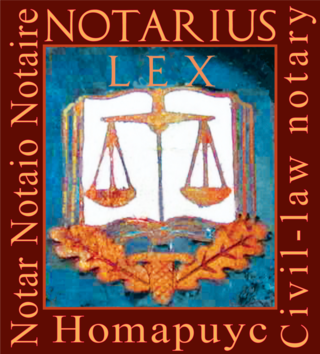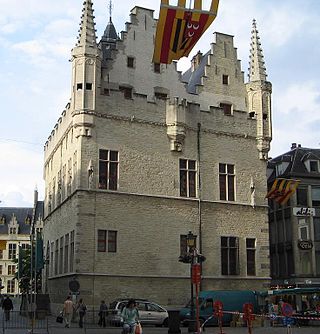
A notary public of the common law is a public officer constituted by law to serve the public in non-contentious matters usually concerned with general financial transactions, estates, deeds, powers-of-attorney, and foreign and international business. A notary's main functions are to validate the signature of a person ; administer oaths and affirmations; take affidavits and statutory declarations, including from witnesses; authenticate the execution of certain classes of documents; take acknowledgments ; provide notice of foreign drafts; provide exemplifications and notarial copies; and, to perform certain other official acts depending on the jurisdiction. Such transactions are known as notarial acts, or more commonly, notarizations. The term notary public only refers to common-law notaries and should not be confused with civil-law notaries.

The European Court of Justice (ECJ), formally just the Court of Justice, is the supreme court of the European Union in matters of European Union law. As a part of the Court of Justice of the European Union, it is tasked with interpreting EU law and ensuring its uniform application across all EU member states under Article 263 of the Treaty of the Functioning of the European Union (TFEU).

Civil-law notaries, or Latin notaries, are lawyers of noncontentious private civil law who draft, take, and record legal instruments for private parties, provide legal advice and give attendance in person, and are vested as public officers with the authentication power of the State. As opposed to most notaries public, their common-law counterparts, civil-law notaries are highly trained, licensed practitioners providing a full range of regulated legal services, and whereas they hold a public office, they nonetheless operate usually—but not always—in private practice and are paid on a fee-for-service basis. They often receive generally the same education as attorneys at civil law with further specialized education but without qualifications in advocacy, procedural law, or the law of evidence, somewhat comparable to solicitor training in certain common-law countries.

A bailiff is a manager, overseer or custodian – a legal officer to whom some degree of authority or jurisdiction is given. Bailiffs are of various kinds and their offices and duties vary greatly.

The Service Regulation, officially the Council Regulation (EC) No. 1393/2007 on the service in the Member States of judicial and extrajudicial documents in civil or commercial matters, is a European Union regulation in the field of judicial cooperation. It allows service of judicial documents from one member state to another without recourse to consular and diplomatic channels.

The Court of Cassation of Belgium is the supreme court of the Belgian judiciary. The court is composed of thirty judges with life tenure who are nominated by the High Council of Justice of Belgium and appointed by the Belgian federal government. The court handles cases in the two main languages of Belgium, Dutch and French, and provides certain facilities for cases in German. The court is assisted in its work by a public prosecutor's office and a bar association, which both function separately from other structures. The duty of the public prosecutor's office is to provide advisory opinions to the court on how the law ought to be interpreted and applied. The attorneys of the court's bar association assist litigants in proceedings before the court; in certain cases, their assistance is mandatory.
The Constitution of Luxembourg is the supreme law of the Grand Duchy of Luxembourg. The modern constitution was adopted on 17 October 1868.

The Court of Quebec is a court of first instance in the Province of Quebec, Canada.

The tribunals of first instance are the main trial courts in the judicial system of Belgium. The tribunals of first instance are courts of general jurisdiction; in the sense that they have original jurisdiction over all types of cases not explicitly attributed to other courts. They handle a wide range of civil cases, criminal cases, and cases under the scope of juvenile law and family law. They also hear appeals against the judgements of the police tribunals and justices of the peace. The judgements of the tribunals of first instance can be appealed to the courts of appeal in turn. There is a tribunal of first instance for each of the twelve judicial arrondissements ("districts") of Belgium, except for the arrondissement of Brussels. The arrondissement of Brussels has two tribunals of first instance, a Dutch-speaking one and a French-speaking one, due to the sensitive linguistical situation in the area. The territories of the current judicial arrondissements largely coincide with those of the provinces of Belgium. Most of the tribunals of first instance have multiple geographical divisions, with each having their own seat. As of 2020, the 13 tribunals of first instance have 27 seats in total. Further below, an overview is provided of all seats of the tribunals of first instance per arrondissement.

The courts of appeal are the main appellate courts in the judicial system of Belgium, which hear appeals against judgements of the tribunals of first instance, the enterprise tribunals and the presidents of those tribunals in their judicial area. There are five courts of appeal for each of the five judicial areas, which are the largest geographical subdivisions of Belgium for judicial purposes. The division of the Belgian territory into the five judicial areas is laid down in article 156 of the Belgian Constitution. A judicial area covers multiple judicial arrondissements ("districts"), except for the judicial area of Mons. Each arrondissement has a tribunal of first instance. Further below, an overview is provided of the five courts of appeal and the judicial arrondissements their judicial area covers. It is important to note that the courts of appeal do not hear appeals against judgements of the labour tribunals; these are heard by the courts of labour.

The court of labour is the appellate court in the judicial system of Belgium which hears appeals against judgements of the labour tribunals and the presidents of those tribunals in their respective judicial area. There are five courts of labour for each of the five judicial areas, which are the largest geographical subdivisions of Belgium for judicial purposes. Some of the courts of labour hear cases in multiple seats. Further below, an overview is provided of the five courts of labour and their seats. Whilst their territorial organisation is the same, the courts of labour are separate from the courts of appeal, which are the main appellate courts in Belgium.

The court of assizes is the trial court which tries the most serious crimes in the judicial system of Belgium. It is the highest Belgian court with criminal jurisdiction; as such, it is the only Belgian court that can sentence someone to life imprisonment. The courts of assizes are not permanent courts; a new court of assizes is assembled for each new trial. There is a court of assizes in each of the ten provinces of Belgium, as well as one in the arrondissement of Brussels-Capital which is not part of any province. Further below, an overview is provided of the eleven courts of assizes and their seats. They are the only courts in Belgium for which the provinces are used as territorial subdivisions. They are also the only courts in Belgium that hold jury trials. The jury acts as sole trier of fact, but decides on the penalty together with the judges. The trial by jury of certain crimes is laid down in article 150 of the Belgian Constitution. The Belgian courts of assizes have the same origin as their French namesakes.

Under the French monarchy, the Courts of Accounts were sovereign courts specialising in financial affairs. The Court of Accounts in Paris was the oldest and the forerunner of today's French Court of Audit. They oversaw public spending, handled finances, protected crown estates, audited the accounts of crown officials, and adjudicated any related matters of law.

The Parlement of Rouen, also known as the Parlement of Normandy after the place where it sat, was a provincial parlement of the Kingdom of France. It replaced the ancient court of the exchequer of Normandy, set up by Rollo, first duke of Normandy.

From the 15th century onwards, the Great Council of the Netherlands at Mechelen was the highest court in the Burgundian Netherlands. It was responsible for the Dutch-, French- and German-speaking areas. In Luxembourgish the phrase "mir ginn op Mechelen" still means playing one's last trump card. The Grote Raad first sat in the Schepenhuis in Mechelen then, from 1616, in the (old) palace of Margaretha of Austria on Keizerstraat.
The Autorité des marchés financiers (AMF) is the organisation responsible for financial regulation in the Canadian province of Quebec. It regulates the province's financial markets and provides assistance to consumers of financial products and services. As provided for under its incorporating legislation, the AMF's mission is to enforce the laws governing the regulation of the financial sector, notably in the areas of insurance, securities, deposit institutions and the distribution of financial products and services.
The Benelux Court of Justice is a court which is common to the Benelux countries Belgium, Netherlands and Luxembourg. The organisation was established by the treaty of 31 March 1965. The court's budget rests with the Benelux Union and is of 9 judges of the supreme courts as well as 6 judges of the courts of appeal of the three countries. The court is mainly tasked with answering requests for preliminary rulings from the supreme courts regarding regulations which are common to the three countries and serves as a civil service tribunal for personnel of the Benelux Economic Union and the Benelux Organization for Intellectual Property (BOIP), although it may also be tasked with advising the three governments, and with direct judicial tasks following the entry into force in 2016 of a 2012 protocol to the treaty.

The judiciary of Belgium is similar to the French judiciary. Belgium evolved from a unitary to a federal state, but its judicial system has not been adapted to a federal system.
A professional order is an organization which, in a given territory, comprises all the members of the same profession, a profession which can generally be exercised in a liberal manner and which ensures a form of regulation of the profession in question.
This glossary of French criminal law is a list of explanations or translations of contemporary and historical concepts of criminal law in France.











